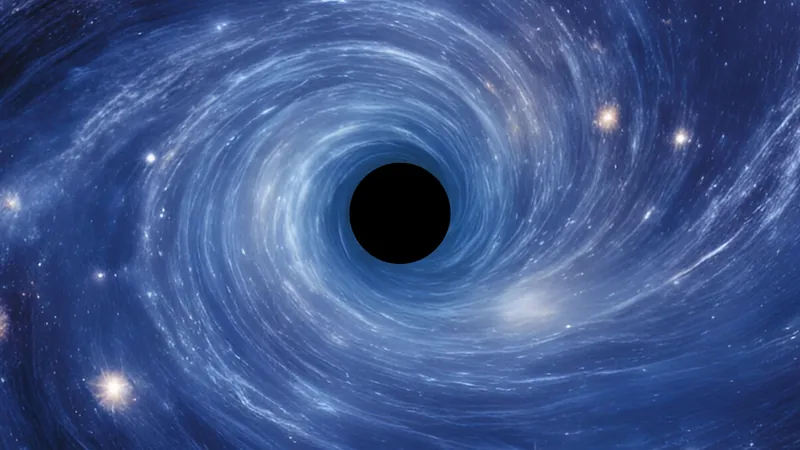
Scientists Unravel the Mysteries of Black Holes: New Theory Could Rework Our Understanding of the Universe!
2025-03-24
Author: Liam
Groundbreaking New Theory on Black Holes
A groundbreaking new theory suggests that black holes—the enigmatic giants of the cosmos—may no longer be the terrifying puzzles of physics they once were. Researchers propose a concept that eliminates the distressing singularity, the central point where our current understanding of the universe collapses under its own weight.
Understanding Black Holes
Black holes are defined by their event horizons, the boundaries beyond which nothing—not even light—can escape the crushing grip of their gravity. This makes direct observation of their interiors impossible, shrouding them in mystery and leading to questions that have puzzled scientists for decades. Using the framework of Einstein’s 1915 theory of general relativity, physicists have long grappled with the concept of singularities—a mathematical break point that suggests a complete breakdown in the laws of physics.
A Shift in Perspective
In a startling shift, researchers now argue that “ordinary black holes” might actually exist without these elusive singularities. Robie Hennigar, a researcher at Durham University, stated that if singularities can be discarded from black hole models, then the understanding of these cosmic anomalies might become much clearer and more relatable.
Einstein's General Relativity and Singularity
Einstein's general relativity explains how mass curves space-time, resulting in gravity. Yet, this same theory predicts the existence of singularities at the centers of black holes—where reality as we know it seems to fall apart, pushing physicists to seek new theories that can successfully merge general relativity with quantum mechanics. Currently, the hope is that these singularities will vanish in the frameworks of a future 'theory of everything'.
Proposed Modifications to Einstein's Equations
The new approach proposes modifying Einstein's equations, allowing gravity to behave differently in extreme conditions. Instead of encountering an infinite singularity, Hennigar and his team suggest that what exists at a black hole's core is a static region of highly warped space-time—one where an observer could theoretically survive, albeit amidst immense gravitational forces.
Exploring the Concept of 'Pure Vacuum' Black Holes
Intriguingly, Hennigar notes that in their model, black holes might essentially be 'pure vacuum' without any matter present, which opens up fascinating possibilities. This shifts the narrative from a disastrous collapse to a more complex structure where matter could potentially exit through what is whimsically termed a 'white hole'—possibly linked to another universe.
The Ongoing Quest for Understanding
However, even with this reformulation of black holes, the quest for a comprehensive model of quantum gravity and an all-encompassing explanation of the universe continues unabated. The collapse of stars into black holes is a frequent phenomenon in the cosmos, highlighting ongoing mysteries that extend beyond current knowledge.
Future Implications of the Research
What does this mean for the future of understanding black holes? Although the research provides valuable insights, it also raises fresh questions. For example, if the singularity is absent, what happens to the matter drawn into the black hole? The team suggests it ultimately exits through a white hole, a concept rife with its own challenges and requiring further exploration.
Empirical Evidence and New Avenues of Research
The search for empirical evidence supporting this theory remains a daunting task, given that black holes are inherently hidden from view. Yet, exciting avenues are opening up: gravitational waves—ripples in space-time detected by astronomers—could potentially unveil new insights about the incredibly strong gravitational fields black holes create. Moreover, if this theory holds water, specific signatures from the early universe, particularly during cosmic inflation post-Big Bang, could serve as hints toward these modified gravitational effects.
Implications for Dark Matter
Additionally, this new conceptual framework might influence how we think about dark matter, suggesting that microscopic black holes could contribute to its makeup.
A Long Journey Ahead
As scientists continue to probe the depths of space and time, one thing remains clear: the journey to understand black holes is far from over, and each revelation leads us closer to unraveling the mysteries that lie at the very heart of the universe!









 Brasil (PT)
Brasil (PT)
 Canada (EN)
Canada (EN)
 Chile (ES)
Chile (ES)
 Česko (CS)
Česko (CS)
 대한민국 (KO)
대한민국 (KO)
 España (ES)
España (ES)
 France (FR)
France (FR)
 Hong Kong (EN)
Hong Kong (EN)
 Italia (IT)
Italia (IT)
 日本 (JA)
日本 (JA)
 Magyarország (HU)
Magyarország (HU)
 Norge (NO)
Norge (NO)
 Polska (PL)
Polska (PL)
 Schweiz (DE)
Schweiz (DE)
 Singapore (EN)
Singapore (EN)
 Sverige (SV)
Sverige (SV)
 Suomi (FI)
Suomi (FI)
 Türkiye (TR)
Türkiye (TR)
 الإمارات العربية المتحدة (AR)
الإمارات العربية المتحدة (AR)